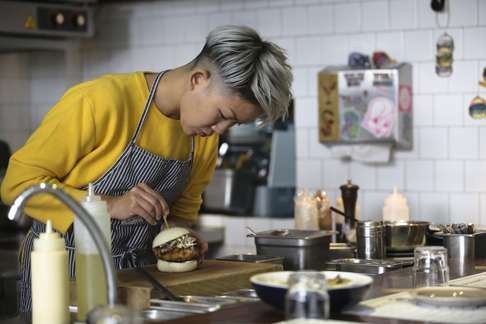
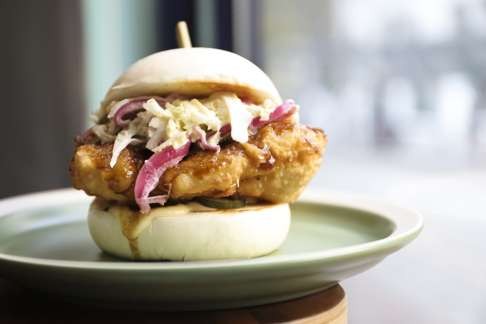
Chow, who has worked with Alvin Leung, Que Vinh Dang and Matt Abergel, is best known for the burger-style steamed buns she sells at Little Bao
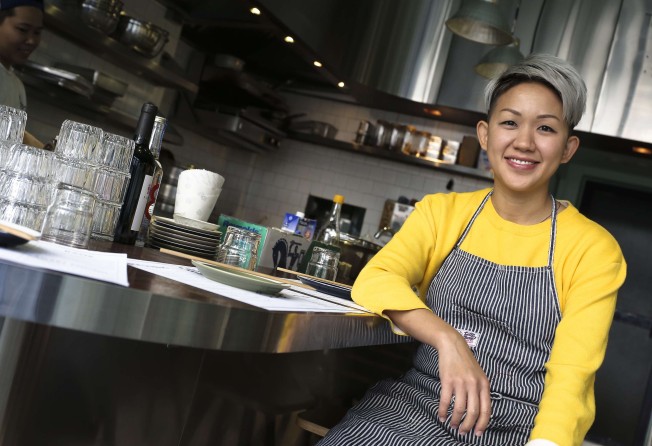
May Chow rolls up in a taxi to her restaurant, Little Bao, on Staunton Street, more than 30 minutes after we were scheduled to meet. I ask her jokingly if she’s suddenly turned into a princess, keeping the commoners waiting, but she’s full of apologies, saying the traffic was really bad.
Yesterday, it was announced that Chow was voted Asia’s Best Female Chef 2017 by more than 300 globetrotting chefs, restaurateurs, food lovers, journalists and bloggers within the region, who also nominate the places that make it onto the annual Asia’s 50 Best Restaurants list, the results of which will be announced in Bangkok in February. (This writer is the A50 Best academy chair for the region of Hong Kong, Macau and Taiwan.)


Chow was informed that she’d won back in November, but had to keep quiet until yesterday. “Someone from the 50 Best team called and told me, then they kind of consoled me. They said ‘Are you ready for this?’ They said there’s the option if you want to accept or decline. The award comes with a lot of responsibilities. There are only so many female chefs in Asia. Being awarded best female chef, a lot of people in the industry say, ‘Is it good or bad?’ You have to consider that – is it a positive thing for affirmative action, or is it ‘Why is there a special award [for females]? Why shouldn’t they be in the same category as other chefs [for the 50 Best list]?’ I see it as a positive thing, and I understand what they’re trying to do and the reason they have this award.”
Chow briefly considered declining, she says. “I was thinking, ‘No, why me?’ I was like that at first. I’ve never been an awards-driven person, I never won anything, really, until this year. They say ‘With great power comes great responsibility’, but it’s more like, are you ready for the responsibility that is to come? What are you supposed to do, how do you act in representing women in this context?”
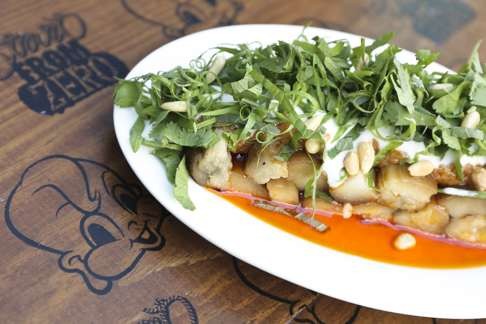
They discouraged her from other creative activities, though. “My parents love me to death, but I’m very different. When I was young I wanted to do horse riding, I wanted to learn ceramics. They made excuses, they said, ‘If you ride horses your ass will get really big and who will love you?’ And I’m looking at all the jockeys and thinking ‘None of them have a big ass; where did that come from?’ I wanted to learn ceramics and my mum was so scared of the turning wheel, she said ‘You’re going to cut your hand off!’ They wanted to protect me, so it was no, no, no.’ I needed to find a creative outlet and I wasn’t getting it.”
Her college counsellor at her boarding school, Suffield Academy, in Connecticut, wasn’t any more encouraging when she told him that she wanted to be a chef. “He gave me a list of schools[to apply to] and of course, me being Asian, he said ‘You should go to Boston University or Boston College’ – all the typical places for Asian students. I said, ‘Is there any culinary school I can go to?’ They didn’t suggest the CIA [Culinary Institute of America] or anything – they just said ‘You can’t go to culinary school because they’re all at community colleges and your parents won’t approve so we can’t offer you any options. Choose from that list.’”
Chow went to Boston University to take a degree in hotel management. When she was in her third year, the university started offering cooking classes by Boston chefs. Despite not having a work visa or a car, she persuaded a chef to hire her part-time, then, after graduating, she moved to Los Angeles, where she cooked with a friend who was private chef to director James Cameron.
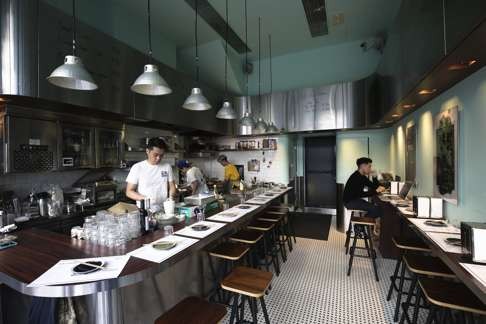
She went on to work at [now-closed] TBLS with Que Vinh Dang, as executive chef for a private kitchen, and with the man she calls her mentor, Matt Abergel, at Yardbird.
Hongkongers got their first taste of the little baos at the Island East Market, in 2012. “I thought, ‘What’s not available in Hong Kong that’s fun and easy to understand.’ Matt said, ‘That’s stupid – don’t do it, do something else.’ He said, ‘Think about it – in New York, Baohaus has done it, David Chang [of Momofuku] has done it.’ I said ‘It’s a great idea, who cares. It’s a fricking farmer’s market.’
“So he said one thing and I’ll be forever thankful. He said, ‘If you really want to do it, make it look like a burger.’ I didn’t understand why, it could be any shape. He said ‘You don’t understand what a burger shape means to people. There are certain things that mean something to people. You can tell them there’s a bao that looks like a taco but it tastes like a bao – that’s too confusing. Simplify it and make it look like a burger.’
“Then Matt called me one night at 4am. He said, ‘I had a dream, I dreamed you had 100 bao shops. I saw it, it’s so real – you need to do this.’ He gave me his blessing and I felt more comfortable because I love Matt and respect him. So it was 10am and we were setting up. I had brought flat tops, fryers – who brings flat tops and fryers to a farmers market in Hong Kong? No one. Everyone else had steam warmers. But I come from a chef background. The moment I put the pork belly on the flat top people were asking ‘what’s that?’ At 10am it’s just old ladies, local people – but they were interested. So the line started. By noon we were sold out. And at the next one we tried to double it and they sold out.”
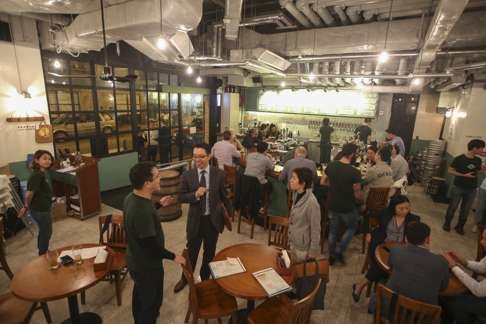
She runs her restaurants differently to “old school” chefs, who come to work even when they’re ill, and who are focused solely on cooking. “I treat my staff differently. I pay them well. Every time I open a new restaurant it’s not about me being better, it’s ‘Can I give them an extra day off if I make more money? When can I give them health benefits?’I want it so when they get married, they think, ‘I have money to spend on my wedding, or I can go on this amazing holiday.’ I don’t want them to be a slave to my restaurant. I want them to work hard, I have a certain standard, but I want them to have free time, so they can have their own lives. I even think how can I hire more part-time kids. I have some part-time kids who are super energetic, super happy, they do great jobs. And I ask them how come they can’t work full time and they say, ‘I just want to dance hip hop’. I think that’s cool. I think these days people can have multiple careers and multiple interests, and I think it’s OK.”